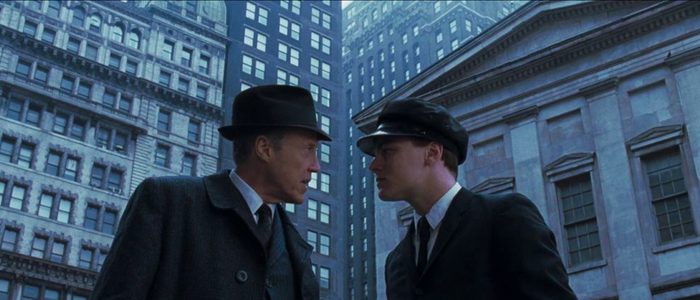21st Century Spielberg Podcast: With 'Catch Me If You Can' And 'The Terminal', Steven Spielberg Found Light In The Darkness
(Welcome to 21st Century Spielberg, an ongoing column and podcast that examines the challenging, sometimes misunderstood 21st century filmography of one of our greatest living filmmakers, Steven Spielberg. In this edition: Catch Me If You Can and The Terminal.)"Home is the place where, when you have to go there, they have to take you in," wrote Robert Frost. After the bleak future worlds of A.I. and Minority Report, Steven Spielberg made two seemingly light, breezy films that could very well be cinematic explorations of that Frost quote.The main characters in Catch Me If You Can and The Terminal are both in search of home. Both in the literal sense, and the abstract sense. If home really is the place where, when you have to go there, they have to take you in, then the main characters of Catch Me and Terminal perhaps have no real home at all. And what a terrifying thought that is.Catch Me If You Can and The Terminal were Spielberg's pivots out of darkness. Gone were the oppressive, often hellish futurescapes of A.I. and Minority Report. In place of the darkness came a sunny, funny trip back to the 1960s, followed by a stop-over into present day. On the surface, these two films were light hearted, brisk affairs. Yet even here, beneath the brightly lit retro fashions of Catch Me and the slapstick humor of The Terminal, melancholy still lurks. It was perhaps a confirmation that even when Spielberg tried to go light in the 21st century, darkness still found its way in.
"Where are you going tonight, Frank?"After the darkness of A.I. and Minority Report, Steven Spielberg decided what he needed to make was an "upbeat, dessert of a movie." Catch Me If You Can, based on the book by real-life con artist Frank Abagnale, had been bouncing around Hollywood since the 1980s. However, no real movement took place on the project until the 2000s. At one point, David Fincher was going to direct. Then Gore Verbinski.Finally, the film ended up in Spielberg's lap. It may not have seemed like an outwardly Spielbergian film, especially at that time. The script was low on special effects, and low on spectacle. It was instead a character piece, with a pretty darn good true story – when he was a teenager, Frank Abagnale began conning his way into several professions. Airline pilot. Doctor. Lawyer. Along the way, he added check fraud to his repertoire, and made himself an ill-gotten fortune. The material didn't scream "Spielberg!", but it was exactly what Spielberg wanted.The way Spielberg saw it, Catch Me If You Can was "an opportunity to take a creative vacation." "I had just finished shooting Minority Report and was in something of a dark place," the filmmaker said. "I thought this would be a breath of fresh air for me. I enjoy that whiplash sensation of going from a film like Jurassic Park to a Schindler's List, and now from Minority Report to Catch Me If You Can."Yet Catch Me If You Can isn't Spielberg on autopilot. The filmmaker didn't use the lighter movie to take it easy. Instead, he crammed multiple locations, wardrobe changes and set pieces all into a wham-bam 52-day shooting schedule, and ended up delivering one of the most enjoyable films of his career.It's also a personal film. Perhaps the most personal film Spielberg had made in some time. The filmmaker saw himself in Frank Abagnale, and found ways to stitch his own life experiences onto the character.There is, of course, the theme of a lost boy searching for his father. Daddy issues were a major part of most Spielberg films, but Catch Me took things a bit further. When Spielberg was 19, his parents divorced. The divorce was hard on the future-filmmaker, and he laid the blame of the split solely at the feet of his father. Later, Spielberg learned that the divorce had actually been his mother's idea. She had fallen in love with a family friend, and decided to leave Spielberg's father for this other man. Even after learning this, however, Spielberg still held his father responsible.Eventually, Spielberg's wife Kate Capshaw urged him to reconcile with his father. "I think one of the worst things that happened to me was my voluntary fallout with my father," Spielberg would later say. "And then the greatest thing that happened to me was when I saw the light, and realized I needed to love him in a way that he could love me back."This marital strife gets center stage early on in Catch Me If You Can. As far as Frank Abagnale (Leonardo DiCaprio) is concerned, his parents – smooth-talking Frank Sr. (Christopher Walken), and French immigrant Paula (Nathalie Baye) – are the picture of marital bliss. But Frank's preconceived notions of his parent's happy marriage soon come crashing down. One day, Frank comes home from school and finds another man in the house with his mother – a family friend. A family friend for whom Frank's mother will soon leave Frank's father.This plot point was absent from earlier drafts of the script before Spielberg came aboard. With this knowledge in mind, it's safe to assume it was added to the film at Spielberg's behest. His way of confronting his parent's traumatizing divorce. His way of making the film extra personal."Some of my films have had to do with broken homes and people on the run from their sad pasts," Spielberg said. "But except for those touchstones for me, there are those strands that got me to say: you know, there's something also about me that I can say through the telling of this kind of lighthearted story."The impending separation of his parents, and by extension the obliteration of his idea of what "home" is, sends Frank into a life of crime. DiCaprio, an actor who often seems both boyish and mature at the same time, is perfectly cast, able to easily dip in and out of Frank's schemes to pass himself off as older than he really is.Spielberg plants the seeds of Frank's talents early. The young man ends up in a new public school, still wearing the tie and blazer combo from his previous private school. He's instantly an outcast; a freak; a weirdo. So what does he do? He quickly struts to the front of the class and tells the students he's their new teacher. And they buy it. Frank has a gift for making people believe whatever bullshit he dishes their way. It's a talent he's inherited from his father, another con man. Frank Sr.'s cons are small and petty, but end up becoming big enough that they bankrupt his entire family. Frank is determined to not suffer the same fate. He's going to be rich, even if he has to steal it.Wrapped up in all of this is a foolish, childish idea that if Frank can somehow make enough money, he can somehow put his broken family back together again. That he can use his stolen cash to buy back his idea of home.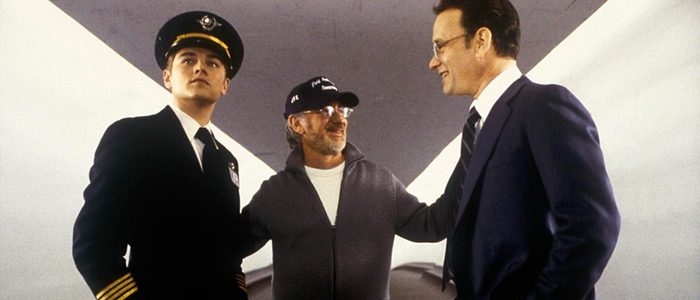
No One Else To Call
From here, Catch Me If You Can almost never sits still. It's a character movie that moves like an action movie, with Frank inhabiting one life after the next. He poses as an airline pilot, something that seems harmless enough until he's forced to serve as a co-pilot during an actual flight. He then poses as a doctor, another gig that he thinks will be harmless until he's forced to offer advice on people who are really injured. He starts posing as a lawyer, and attempts to settle down with a really nice girl (a scene-stealing Amy Adams, decked-out in comical braces). This, too, backfires, no doubt devastating the nice girl in the process.And through it all, Frank keeps cashing phony checks and making more and more and more money. You can't steal that much money without someone noticing, and sure enough, someone does: Carl Hanratty, an FBI bank fraud agent played by Tom Hanks.Catch Me If You Can is ultimately about Frank fleeing from one father figure (Walken) for another (Hanks). While Frank loves and idealizes his father, the man is a broken, sad figure. One of the film's most heart-wrenching scenes comes late, when Frank attempts to reconnect with his father by buying him an expensive car. His father wants none of it. And he coldly laughs off Frank's talk about getting the family back together.In a sense, Frank's father doesn't want to see him anymore. He knows his son will always be on the run. "Where you going tonight, Frank?" he asks a trifle coldly. Carl Hanratty, in sharp contrast, wants nothing more than to catch up with Frank. Sure, the reason he wants to catch up with the young man is to put him in jail, but a strange sort of respect begins to form between the hunter and the hunted. Carl is impressed with how skilled Frank is. And Frank? Well, Frank has no one left to turn to. One of the running gags of the film involves Frank calling up Carl at FBI headquarters every year on Christmas Eve. "You have no one else to call," Carl tells him.Hanks doesn't take many supporting roles, and he probably wouldn't even agree to such an offer for anyone else by Spielberg. But he's so delightfully affable here. A straight-laced, humorless sort of guy who is somehow very funny. It's a charming performance, and it's also fatherly. There's a stern warmth in Hanks' portrayal of Carl Hanratty, resulting in an aloof-yet-attentive characterization that makes him easy to like.Something similar could be said for DiCaprio's take on Frank. Frank is a criminal, and in many cases – like the scene where he's asked to consult on an injury at the hospital – he's putting lives in danger. But we can't help but like Frank. He's bucking the system; revolting against the establishment. He's also living the dream – saying to hell with an honest day's work and making a fortune. It's fun to watch him break the law."Part of the inspiration of Catch Me If You Can for me is that it shows you can turn your life around and make something better of yourself," Spielberg said. "But it's also a story that is pure, unadulterated fun. It has tremendous joie de vivre, which is reflective of who the real Frank Abagnale is to me."Yet the fun can't last forever. Carl eventually does apprehend Frank, and has nothing but bad news for the young man: not only is he going to prison, but his father has died. Frank's reaction to all this is to escape custody, and to flee. To flee to his mother's house on a snowy Christmas night. And once he gets there, whatever remnants of home are officially destroyed. Peeking through the window, Frank sees his mother by the Christmas tree, happily laughing with her new family – the family friend she left Walken's character for, and the new children she's had with them. Frank is literally now an outsider looking in, peeking through a window, unwelcome. Uninvited. If "home is the place where, when you have to go there, they have to take you in," Frank has no home.Except maybe he does. With the FBI, and with Carl Hanratty. Carl essentially adopts Frank, plucking him from prison and making him an offer: live out the remainder of his prison sentence working for the FBI, helping to catch con artists like himself. Frank takes the deal, but it's only a matter of time before his old wanderlust kicks in. He comes very close to fleeing the coop. And yet, he returns. This scene is played as amusing, even touching. But it's actually rather sad. Frank returns to Carl and the FBI because, just as Carl said before, "You have no one else to call."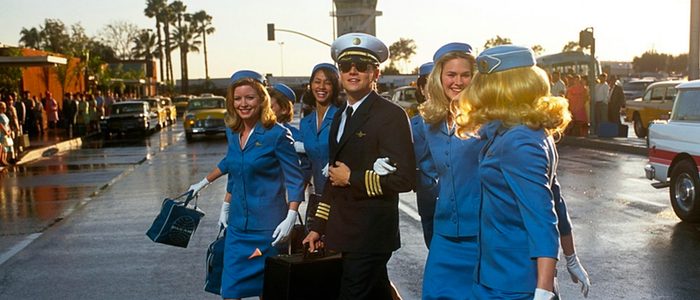
Sunshine and Darkness
On the surface, Catch Me With You Can is a light-hearted romp. A funny, fast-paced comedy that never sits still and always tries to leave the audience with a smile. Spielberg and frequent cinematographer Janusz Kaminski worked hard to give the film a sunny, welcoming look. The vibrant 60s fashions pop, and the whole world has a glow to it."I said to Janusz: 'We've done all these dark, backlit, contrasty movies for almost nine years. Let's, for the first time, put lights right in people's faces. Direct light on their faces. Let's make this whole era blossom the way I remembered it," Spielberg said.Kaminski later added: "The visual approach was really very simple: Let's have fun; let's create a world that's slightly idealistic, and not too serious. The lighting reflects that. It's like a glass of champagne."Yet beneath that not-too-serious veneer lurks loneliness. There's Frank's inherent loneliness, illustrated by his longing for his old family and someone new to connect with. And then there are the reoccurring scenes set on Christmas, in many ways a lonely holiday. And then there's that ending. That scene of Frank, resigned to his fate, strolling back into the drab FBI office building to help Carl, the only family he has left.Ultimately, Catch Me If You Can is a deft blend of sunshine and darkness. It's Spielberg having fun while reminding us that he has serious things on his mind. And it's a personal movie that may be more personal than he ever realized.Around the time Catch Me came out, Spielberg commented in several interviews that he could relate to Frank's con artist ways because of one specific incident in his past. The way the filmmaker tells it, he started sneaking on the Universal Studios lot at age 16, dressed in a suit and tie, and set up shop in an empty office on the lot for three months."When I was first trying to become a movie director, I became a 16-and-a-half-year-old executive," Spielberg said. "I put on a suit and tie and carried a briefcase, and walked right past Scotty at the main gate at Universal Studios every day during summer vacation. Five days a week for three months, I walked on and off that lot...and was, for that one moment, Frank Abagnale. "It's an amusing story, and it seems tailor-made to tie into Catch Me When You Can. Just like teenage Frank, Spielberg was pretending to be older and more professional than he really was. He was faking it till he made it. In most versions of the story, Spielberg said that during his big phony summer at Universal, he was befriended by a man named Chuck Silvers, assistant to the editorial supervisor for Universal TV.Here's the thing: this probably never happened. Spielberg has told variations of this story since the 1980s, and the details have changed often. And Chuck Silvers himself later confessed that the story was likely completely made-up. It was Spielberg's long-con. Just like Frank Abagnale, he took us for a ride, and we went along with it. Because it was entertaining. Because we had no reason to doubt it. And because it was from a completely different era – just like the setting of Catch Me If You Can"[Catch Me if You Can] could only have taken place in an age of innocence," Spielberg said, "which we are no longer about as a global community. Today people are generally more suspicious of each other, whereas in the sixties there was a community of trust. That innocence was something all of us are nostalgic about."That nostalgia for a more innocent time, coupled with the ever-present longing for home, would continue on into Steven Spielberg's next film.
We Need To Smile More
"I am going home."Steven Spielberg doesn't make many films that take place in a contemporary setting. The bulk of his filmography consists of stories set either in the past or the future. Yet every now and then, he'll return to the present just to remind us he can. As was the case with 2004's The Terminal.The Terminal was the first Spielberg film to go into production after 9/11, and yet it's not what one would call an overtly political film. Indeed, Minority Report seems like a more direct reaction to 9/11 than The Terminal. But that's part of The Terminal's design. With this film, Spielberg was using somewhat alarming current events to craft a happy-go-lucky story, whether we wanted it or not."I wanted to do another movie that could make us laugh and cry and feel good about the world," the filmmaker said. "I wanted to do something else that could make us smile. This is a time when we need to smile more and Hollywood movies are supposed to do that for people in difficult times."Some may find this willfully oblivious. Or perhaps naive. The events of September 11th changed the country as we knew it, and would hurtle us into seemingly never-ending wars. What was there to smile about?Yet Spielberg, the eternal optimist, still didn't want to give himself over entirely to the darkness. Yes, just like Catch Me If You Can, a darkness and melancholy seeps into The Terminal. But Spielberg won't let it entirely take hold. He can't. To do so would be to admit defeat.Spielberg came across The Terminal by chance. Here is how Steven Spielberg spends his weekends, according to the man himself: he sits down with a dozen or so screenplays, and reads through them, hoping to find his next film. During one such weekend marathon session, he read The Terminal and was blown away. The rest is history, although most will tell you The Terminal amounts to little more than a footnote in the big book of Spielberg. Yet there's more to the movie than meets the eye. While Catch Me If You Can was a film that didn't rely on special effects, and shot mostly on location, The Terminal is one big special effect. Yes, it's a character piece about one man, but the world that man inhabits is entirely fabricated from the ground up. The Terminal is set almost entirely in an airport, and to get the film made, Spielberg had a full scale, almost fully functioning airport built. You could practically land real planes on this set.That may not seem very impressive on paper, but in actuality, it's staggering. The airport of The Terminal never feels fake; never feels constructed for a story. It's a living, breathing, exhausting place, full of countless extras bustling to and fro. At one point, Spielberg sets up an amazing tracking shot where the camera starts on the face of main star Tom Hanks, then quickly zooms up and out, revealing the entire airport in the process. There's an entire world in here, and it's as if every single person in this airport has their own story. We just happen to focus in on one story in particular.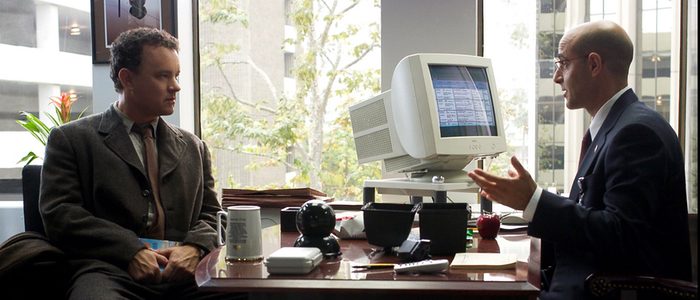
America Is Closed
That story is the story of Viktor Navorski (Hanks), a man from the (fictional) nation of Krakozhia. Viktor has come to New York City to fulfill a promise. Unfortunately, just as Viktor arrives at the airport, a civil war breaks out in his country. The civil war renders Krakozhia a non-country as far as the United States is concerned. As such, Viktor can neither return home – his passport has been seized – nor leave the terminal and set foot on American soil. He is now a man without a country.Viktor's main obstacle is Frank Dixon (Stanley Tucci), the customs director for the airport. "America is closed," Dixon tells Viktor. It would've been simple to make Dixon a sneering, conniving villain. A self-centered bureaucrat like the mayor from Jaws. But Dixon isn't exactly a bad guy. He's just someone doing his job. And he's even willing, at first, to look the other way and let Viktor illegally escape the airport.But Viktor doesn't escape. He stays, and begins living in the terminal. Over the course of his stay, he befriends several characters. There's a custodian (Diego Luna) in love with a customs agent (Zoë Saldana); there's a janitor (Kumar Pallana) who revels in making people slip on the wet floors; and there's a flight attendant (Catherine Zeta-Jones) stuck in a go-nowhere affair with a married man.These people filter in and out of Viktor's life as Viktor grows more and more accustomed to America. Or at least, a version of America filtered through the world of the airport."I thought it was an amazing idea and I had an immediate affinity for Viktor's story," said Spielberg. "I believe all of us have felt a little bit like Viktor at some time in our lives – this displaced person in search of a life. And I don't know anyone who hasn't, at some point, spent longer sitting in an airport chair than on the airplane ride itself. Airports have become small microcosms of society: they're places to eat, shop and meet people."There's an earnest (and again, possibly naive) exploration of Viktor's plight inherent to The Terminal. In the film's somewhat sanitized view, there's a goodness even in the coldest of hearts. "Compassion: that's the foundation of this country!" Dixon's supervisor scolds him at one point. At the time, a line like this may have worked. Here, in the wake of the Trump administration's highly controversial, life-ruining travel bans, it causes a double-take. We want to believe there are people in positions of power who still think like this, but it's hard to believe there are. "It's really an immigrant's tale, although technically, Viktor is not an immigrant," Spielberg said. "It goes back to what makes America so great and so strong – immigrants coming to 'The Land of Milk and Honey' from around the globe, coming to a place where they're allowed to dream of a better life for themselves. In some ways, we've lost sight of the immigrant's plight because security is more intense...The Terminal celebrates the great American melting pot."Spielberg is, of course, right. This is how the country, and immigration, should work, even if those in power right now certainly don't think so. This is Spielberg's inherent goodness shining through. His eternal optimism, hoping for the best even in the face of the worst. And perhaps as a result, we need a movie like The Terminal now more than ever. Perhaps we need someone to remind us of what we're in danger of losing, even if it's done in blunt, unsubtle terms. Perhaps in many ways, The Terminal was ahead of its time.Still, Spielberg isn't so naive that he can pretend everything is fine. There are throwaway lines here and there hinting at unpleasantness, such as the scene where Dixon tries to have Viktor thrown in jail without success. Afterward, he mutters "The country's detaining so many people there's no room for him anywhere," and moves on. The implications of such a line are dark to the extreme, but The Terminal doesn't want to dwell on them.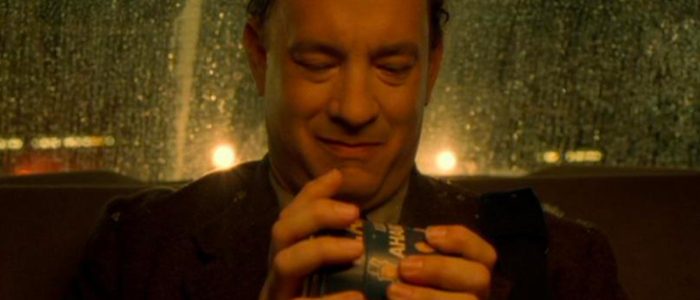
Where Do You Want To Go?
The key to The Terminal's success – other than Spielberg's direction – is Tom Hanks' lead performance. Hanks' approach to Viktor's broken English seems genuine; not something put on simply for laughs. What's more, Hanks is adept at making Viktor seem like an outsider without dipping fully into parody. In less skilled hands, this could've turned into a performance akin to Andy Kaufman playing Latka Gravas. Instead, Viktor seems real.Part of this has to do with pathos. When Viktor first learns about the civil war in his country (via television news), Spielberg zooms in close on Hanks' face, and the actor conveys a range of shock, fear, and heartbreak. Just like with Frank Abagnale, it is easy for us to become wrapped-up in Viktor's story, and to root for him.Because just like Frank, he's a man without a home. That Robert Frost quote runs through the mind again: "Home is the place where, when you have to go there, they have to take you in." But no one in America will take Viktor in, and he can't even return to Krakozhia. There's simply nowhere he belongs.Not everything in The Terminal works. Most of the supporting characters are a wash. Everyone is performing amiably, but it's hard for us to care much for the bulk of them. And an attempt at romance between Hanks' character and Catherine Zeta-Jones' stewardess character never really gets off the ground.And then there's the film's central MacGuffin: Viktor's reasoning to be in New York. He has a coffee can filled with autographs from every jazz musician featured in Art Kane's historic "A Great Day in Harlem" photograph. Every autograph, except one: Benny Golson. The autographs belonged to Viktor's father, who has since died. Viktor made a death-bed promise to his father that he would get Golson's autograph (if you thought this was going to be the one Spielberg film without a father subplot, think again!). This revelation is meant to be touching and sweet, but it doesn't land as well as the script by Sacha Gervasi and Jeff Nathanson wishes it would. The revelation is almost an afterthought, really. We don't need to know why Viktor is in America. We just need to know he's there.Despite these flaws, there's such inventiveness on display here. Spielberg stages big, comical moments like classic silent movie slapstick. He draws from Hanks a hilarious, frequently silent performance. And he always has the camera on the move. It zigs and zags from one corner of the terminal to the next, conveying an entire world in the process. When Viktor first arrives at the airport, Janusz Kaminski bathes the film in a cold, sterile blue look. Yet as Viktor begins to settle in, and become more and more at home, the color of the film begins to warm up, as if Spielberg and Kaminski are slowly cranking up a thermostat and creating a cozy environment for us.And then there's the film's heartening ending. The civil war ends, and Viktor is finally able to both enter America and return home to Krakozhia. He's able to track down Benny Golson's autograph. Satisfied, he climbs into a taxi as the snow drifts down on New York City."Where do you want to go?" the cab driver asks."I'm going home," Viktor says after a beat, and those words sound so lovely; so welcoming. After all, there's no place like home.
Light, Then Dark
"I don't plan my career, you know," Steven Spielberg said after the release of The Terminal. "I don't think I'll go dark, dark, dark, then light, then dark. I react spontaneously to what falls into my arms, to what is right at the time."
Catch Me If You Can and The Terminal are companion pieces, even if a few years separate their releases. In many ways, they seem to be reactions to each other.Catch Me If You Can is a film always on the movie, while The Terminal is all about standing still.Catch Me If You Can is low on big visual effects and big sets, while The Terminal is loaded with them. And both films were a reminder that Spielberg could still give audiences light-hearted films to enjoy.But now the lightheartedness was seemingly gone from Spielberg's system. His next two films would take the filmmaker to dark, hopeless territory. In 2005, he would release two very different films that were both stark, often chilling reactions to September 11th, and the events that followed it. The end result would be two of the best films of his already incredible career.
***
In the next edition of 21st Century Spielberg, Part 3: The War On Terror – War of the Worlds & Munich.

